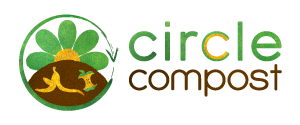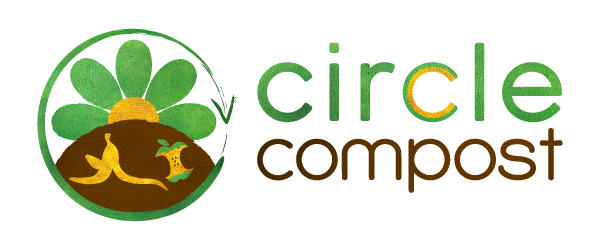We’ve been doing this for a while now and we understand not everyone is an expert on what breaks down in a compost pile. To help our cause, our website has a list of what we accept, but in this post we’d like to point out what does not go into our buckets. The following are commonly found items that require removal by hand, causing us to waste time and resources. They do not break down into plant food and can cause the contamination of entire compost batches.
Fruit Stickers: These are the most common non-compostable items we see in our customers’ buckets and many are made of polyethylene (a.k.a. plastic). Polyethylene is often made from petroleum or natural gas. The stickers will not break down and will remain in their “pristine” state throughout the compost piles’ lifecycles, which, at least, makes them easy to spot and remove. The stickers can end up on the ground of our gardens and farms and their removal is tedious for our staff, who can be using their time for more important tasks. The stickers will have to go into your regular trash bin, but if you want to keep them much out of landfills, consider making sticker art. We understand that it’s impossible to prevent all of these from going into your buckets, but please do your best!
Onion and potato bags: Made of polypropylene, these do not break down and waste space in compost piles. Best to empty their contents and reuse the bags for other purposes, like collecting loose fruit at the market.
Plastic silverware: These are usually made from polypropylene and polystyrene. They are plastic, so no explanation required.
Glossy newspapers: Please recycle these. They may consist of heavy metal based inks and the more we can recycle, the better off we’ll all be.
Rubber bands: Made of latex, whether synthetic or natural, they will not break down in our piles. We see them bundling fruit and vegetables together. But don’t throw them away; there are endless ways to reuse them.
Staples from tea bags: Metal does not belong in compost piles. Please remove the staples from your teabags or opt for tees that do not use staples. Bonus points for purchasing loose teas and reusable pouches.
Paper cups: These are lined with plastic to make the cups water-proof and help protect hands from cold and hot beverages. They can be neither recycled nor composted due to the difficulty of separating the plastic from the paper. Use a water bottle instead. Gatorade cups are the exception – they are lined with carnauba wax and can be composted!
Plants treated with herbicides or pesticides: Crops using compost that contains chemicals can suffer from poor seed germination, deformed new growth, elongated fruit and leaves, and destruction of younger plants. These chemicals can also decrease and kill the helpful microbes that exist in compost piles, slowing down and ending the decomposition process. Please do your best to be aware of where your plants come from, and go organic!


Leave a Reply
Your email is safe with us.
You must be logged in to post a comment.